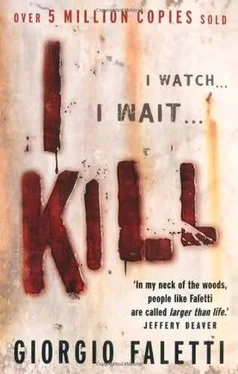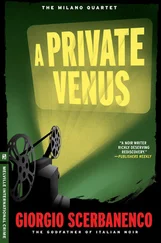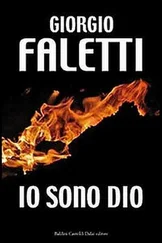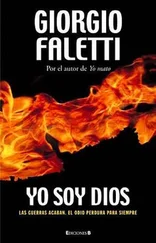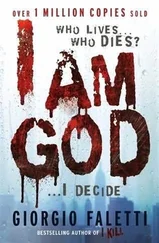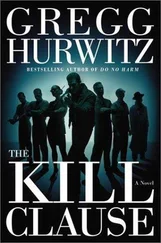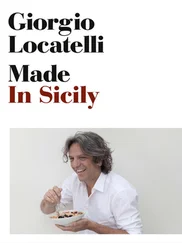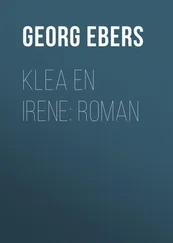
© 2010
Death walks along a street,
Wreathed in faded orange blossoms
Singing and singing
A song
To a white guitar
Singing and singing and singing.
Frederico García Lorca
The man is one and no one.
For years, he has worn his face as a mask, a mere shadow of himself. He is so wiped out by tiredness that he has almost lost his sanity.
There is music, bodies moving. People smiling and talking. The man stands amongst them, leaning against a column as he watches curiously. He thinks that every last one of these people is useless.
He is surrounded by endless faces, people who do not question; people who passively accept their lives and never admit to the boredom and pain of the journey.
At the far side of the room, a man and a woman are sitting next to each other at a table overlooking the garden.
In the soft light she appears as delicate and tender as melancholy. She has black hair and green eyes, so luminous and large that even from where he stands the man can see into them. Her companion is conscious of nothing but her beauty. He whispers into her ear to make himself heard over the blaring music.
They are holding hands and she is laughing, throwing back her head or hiding her face against his shoulder.
Just a moment ago, she turned and looked around, perhaps aware of the fixed stare coming from the man across the room. Their eyes met for an instant, but hers passed indifferently over his face. And then those incredible eyes came to rest once more on the man next to her. He returns her gaze.
They are young, beautiful and happy.
The man leans against the column, thinking that soon they will be dead.
Jean-Loup Verdier pressed the button on the remote, but only started his car when the garage door was halfway up, so as not to breathe too much exhaust. His headlights cut slowly beneath the door and out into the black night. He slipped the automatic transmission into DRIVE and slowly rolled his Mercedes SLK outside. He pressed the CLOSE button and sat taking in the view from his house as he waited for the door to shut behind him.
Monte Carlo looked like a bed of concrete by the sea, the city enveloped in the soft evening haze. Not far below him, in French territory, the lights of the country-club tennis courts, where some international star was probably practising, gleamed next to the skyscraper of the Parc Saint-Roman. Lower down, below the old city fortress towards Cap d’Ail, he could make out the neighbourhood of Fontvieille that had been reclaimed from the water, yard by yard, stone by stone.
He lit a cigarette and switched on the car radio, already tuned to Radio Monte Carlo, as he opened the remote-controlled gate and ascended the ramp to street level. He turned left and slowly drove towards the city, enjoying the warm air of late May.
‘Pride’ by U2 was on the radio, and Jean-Loup smiled with recognition at the band’s unmistakable guitar riffs.
Stefania Vassallo, the show’s deejay, was crazy about U2’s lead guitarist, The Edge, and she never let a show go by without playing one of the band’s songs. Her colleagues at the station made fun of her because of the dreamy expression she wore for months after she got an interview with her idols.
As he drove along the winding road that led from Beausoleil to the city centre, Jean-Loup tapped his foot in time with the music. Marking the upbeat with his right hand on the steering wheel, he followed along as Bono’s rusty, melancholy voice sang of a man who came ‘in the name of love’.
Summer was in the air, and that unique smell one finds only in cities by the sea. An odour of brackish water, pine trees and rosemary. The scent of broken promises and lost bets.
All of it – the sea, the trees, the flowers – would still be there long after he and all the others like him had hurried by.
He drove his convertible with the top down, the warm wind in his hair. Promise filled his heart. He’d placed his bets in life.
Things could be worse.
It wasn’t late, but the road was empty. He flicked his cigarette into the rushing air, watching the bright curve it made in his rearview mirror. As it hit the asphalt it scattered in a blaze of tiny sparks, the last puff of smoke disappearing in the darkness. Jean-Loup reached the bottom of the hill and hesitated, then, deciding to take the city-centre route to the harbour he turned down Boulevard d’Italie.
Tourists were beginning to crowd into the Principality. The Formula 1 Grand Prix, which had just ended, meant the beginning of summer in Monaco. From now on, the city would be bustling with actors and spectators day and night. There would be chauffeured limousines with privileged and bored people inside. There would be small cars with sweaty passengers adoring the sights, like those who stand in front of shop windows wondering when they’d find the time to come back and buy that jacket, others where they’d find the money. Things were black and white – two extremes with shades of grey in between.
Jean-Loup thought that the priorities of life, in the end, were simple and repetitive, and in places like Monte Carlo they could be counted on one hand. Money came first. Some have it and the rest want it. Simple. A cliché becomes a cliché because it has some truth. Money might not buy happiness, but that didn’t seem to bother anyone.
The mobile in his shirt pocket chirped. He pulled it out and answered without looking at the caller’s name: he knew who it was. The voice of Laurent Bedon, the director and writer of Voices, the programme that Jean-Loup hosted on Radio Monte Carlo every night, crackled in his ear in a haze of static.
‘Any chance the star will grace us with his presence tonight?’
‘Hey, Laurent. I’m on my way.’
‘Good. You know Robert’s pacemaker acts up when the deejay isn’t here an hour before airtime. His balls are already smoking.’
‘Really? Aren’t his cigarettes enough?’
‘Guess not.’
Meanwhile, Boulevard d’Italie had turned into Boulevard des Moulins. The brightly lit shops on both sides of the street were a sea of promises, like the beguiling eyes of high-class tarts. All you needed to make your dreams come true was a little cash.
Their conversation was interrupted by more static. He moved the phone to his other ear and the buzzing stopped. As if on cue, Laurent changed his tone.
‘Okay, seriously, hurry up. I have a couple of-’
‘Hold on a sec. Police,’ interrupted Jean-Loup.
He lowered his hand and tried to look innocent. Pulling up to the junction, he stopped in the left lane and waited for green. A uniformed policeman was standing at the corner to ensure that drivers didn’t jump the lights. Jean-Loup hoped he’d hidden the phone in time. Monte Carlo was strict about using mobiles while driving. At that moment he had no desire to waste time arguing with a stubborn Principality cop.
When the lights changed, Jean-Loup turned left, passing under the nose of the suspicious officer. Jean-Loup saw him turn and stare at the SLK as it disappeared down the hill in front of the hotel Metropole. As soon as he was out of sight, Jean-Loup raised his hand and put the phone back to his ear.
‘Out of danger. Sorry, Laurent. You were saying?’
‘I was saying that I have a couple of promising ideas I wanted to discuss with you before we go on air. Step on it.’
Читать дальше
